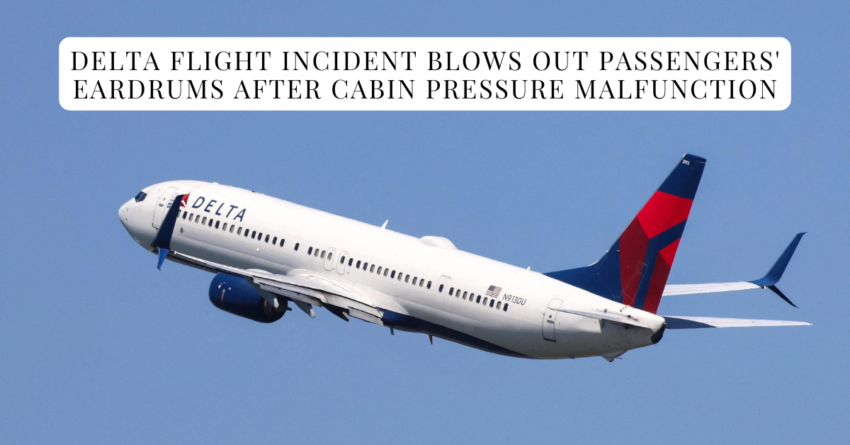A Delta Air Lines flight recently experienced a terrifying incident when a sudden cabin pressure malfunction caused several passengers to suffer from burst eardrums. The flight had to make an emergency descent after a failure in the cabin’s pressurization system. The malfunction led to a rapid drop in cabin pressure, causing significant discomfort and injury to many onboard. This incident has raised serious questions about the airline’s safety protocols and the risks associated with cabin pressure malfunctions.
In this article, we’ll examine the details of the incident, the potential causes of the malfunction, and what passengers can do to protect themselves in such emergencies.
What Happened on the Delta Flight?
The incident occurred during a routine flight when, without warning, the cabin began to lose pressure rapidly. Passengers reported feeling intense pain in their ears, followed by loud pops that indicated their eardrums had burst. Some passengers experienced bleeding from the ears, while others complained of severe discomfort and dizziness.
The pilots quickly responded by initiating an emergency descent to a lower altitude, where cabin pressure would stabilize. Although the crew acted swiftly, many passengers had already suffered significant ear injuries due to the rapid decompression. The plane landed safely, but several passengers required immediate medical attention for their injuries.
What Causes Cabin Pressure Malfunctions?
In airplanes, cabin pressure is controlled by a system that adjusts the air levels as the aircraft gains altitude. As the plane climbs, the air outside becomes thinner, making it harder to breathe without the pressurization system maintaining a safe level for passengers and crew.
However, if the system fails, the cabin can lose pressure quickly, leading to rapid decompression. Several factors can cause a cabin pressure malfunction, including:
- Mechanical failure of the pressurization system
- Faulty seals around doors or windows
- Structural damage to the aircraft
In this Delta flight incident, investigators are still determining the exact cause of the malfunction. However, such incidents are rare, and planes are typically equipped with backup systems to prevent catastrophic failures.
Passenger Safety During Cabin Pressure Incidents
When cabin pressure drops suddenly, the primary concern is maintaining the flow of oxygen to passengers. Most commercial planes are equipped with oxygen masks that deploy automatically in the event of rapid decompression. These masks are designed to provide enough oxygen until the plane descends to a safer altitude.
In addition to oxygen, passengers should remain seated with their seatbelts fastened during such incidents. The rapid descent can cause turbulence, and the safest place for passengers during emergencies is in their seats.
For those who experience ear pain during sudden pressure drops, it’s important to remain calm. Swallowing, yawning, or gently blowing with the nose pinched (a maneuver known as the Valsalva maneuver) can help equalize ear pressure and relieve discomfort. However, in severe cases like the Delta flight incident, the pressure drop was too rapid for passengers to react, resulting in burst eardrums.
The Impact of Burst Eardrums
Burst eardrums, medically known as tympanic membrane perforation, occur when a sudden change in pressure causes the eardrum to rupture. Symptoms include sharp pain, hearing loss, ringing in the ears, and sometimes, bleeding. In severe cases, a burst eardrum can lead to infections or long-term hearing damage.
On the Delta flight, several passengers suffered from burst eardrums, which can take weeks or even months to heal. In some cases, passengers may require medical intervention, including surgery, to repair the damage. The immediate concern for these passengers is managing the pain and ensuring the eardrum heals properly to avoid complications.
Investigations and Delta’s Response
Following the incident, Delta Air Lines has launched an investigation to determine what caused the pressurization failure. The airline has been working closely with aviation authorities and safety inspectors to ensure that such incidents are prevented in the future. Delta has also offered support to affected passengers, providing medical assistance and compensation for their injuries.
Delta’s response to this incident will be closely scrutinized as passenger safety remains a top priority for airlines worldwide. While rare, pressurization failures are serious events that require immediate attention to prevent further risks.
Preventing Future Incidents
Although cabin pressure malfunctions are rare, airlines continuously work to improve safety measures. Aircraft undergo regular maintenance checks to ensure all systems, including pressurization, are functioning properly. In addition, pilots receive extensive training on how to handle emergency decompressions and ensure the safety of everyone on board.
For passengers, understanding basic safety procedures can help reduce the risk of injury during such incidents. Always following crew instructions, knowing how to use oxygen masks, and remaining calm in emergencies are crucial for staying safe.
Conclusion
The Delta flight incident, which resulted in burst eardrums for several passengers, has raised concerns about cabin pressure malfunctions and passenger safety. While the incident was alarming, it serves as a reminder of the importance of airline safety protocols and the need for continuous improvements in aircraft maintenance.
As investigations continue, passengers and the aviation community alike will look for answers about how this malfunction occurred and what steps can be taken to prevent similar incidents in the future. For now, Delta’s swift response and support for injured passengers are crucial in addressing the immediate aftermath of this incident.
FAQs
What caused the cabin pressure malfunction on the Delta flight?
The exact cause of the pressurization failure is still under investigation. Possible causes include mechanical failure or faulty seals.
What happens when cabin pressure drops suddenly?
When cabin pressure drops, passengers may experience ear pain, difficulty breathing, and require oxygen masks. In severe cases, eardrums can burst.
How are passengers affected by burst eardrums?
When eardrums burst, it can result in intense pain, temporary hearing loss, and a persistent ringing sensation in the ears. In severe cases, medical intervention may be needed.
What steps did Delta take after the incident?
Delta Air Lines launched an investigation and provided medical assistance to injured passengers. The airline is working with safety authorities to prevent future incidents.
Can cabin pressure malfunctions be prevented?
Airlines regularly maintain aircraft and train pilots to handle emergency decompressions. While rare, these incidents can be mitigated through stringent safety protocols.

